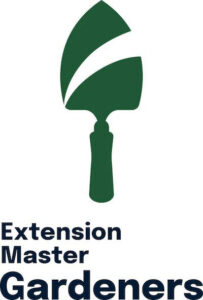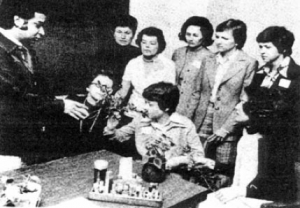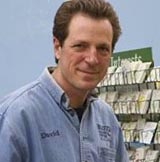
History
The Fairfax County Master Gardeners Association (the FCMGA) formally came into existence in 1997. However, it stems from the Fairfax County Neighborhood Plant Clinic Program, created in 1976 to meet the horticultural needs of the community.
Master Gardeners – part of Cooperative Extension
Master Gardeners is one of the programs run by the Cooperative Extension Service. The Cooperative Extension Service or the Extension Service is a national program located in every state that provides research-based information and services to the agricultural industry, small business owners, youth, consumers, and others in rural and urban communities of all sizes. “Extension” indicates reaching out to the public. Part of the U.S. Department of Agriculture, the Extension Service focuses on agriculture and food, home and family, the environment, community economic development, and youth (4-H).
The Master Gardener program began in 1971 in Washington State. The Puget Sound economy was tied to the success of the Boeing Corporation, which employed 100,000 workers in 1968. Then, the bottom fell out. With the massive hit to the economy, people had more time than money and began growing food to help make ends meet. Washington State University (WSU) Extension Agents David Gibby and Bill Scheer worked in the major metropolitan areas of Seattle and Tacoma, and were inundated with questions from these gardeners.
Gibby began attending garden club meetings in an effort to head off the flow of questions. He came to the realization that here was a pool of lifelong gardeners, already trained and experienced. The Agents proposed recruiting and training volunteers to serve the needs of home gardeners at scheduled plant clinics.
In 1973 Gibby and Scheer began the first classes teaching in public libraries. The first Master Gardeners were certified, and staffed the first plant clinics that year, serving over 5,000 gardeners.
Virginia Cooperative Extension was established in 1914 and is a partnership between Virginia’s two land grant universities: Virginia Tech and Virginia State University. Today, Extension operates out of 107 offices, 11 Agricultural Research and Extension centers, and six 4-H centers across the commonwealth. Our agents, specialists, and volunteers work to assist farmers, empower youth, guide responsible resource management, and advance the wellbeing of all Virginians.
Fairfax County beginnings

Raj and original Master Gardeners
Fairfax County Master Gardeners has its roots in the National Capital Area Federation of Garden Clubs. In 1976, the Washington, DC metropolitan area population overwhelmed extension agents with requests for horticultural advice. Just like the agents in the Seattle area, local agents sought ways to augment their ability to meet the needs of the public.
Federation member, and extension agents from Fairfax and Montgomery Couny’s Extension Agent proposed recruiting Federation members to receive training and work as volunteer “Neighborhood Plant Consultants” in ‘Neighborhood Plant Clinics.’ The Federation would recruit volunteers, and the agents would train them.
In March 1976, Fairfax extension agent Raj Waghray, his counterparts, and their staffs trained the first 45 volunteers. The concept became reality during the 1976 growing season. The first 45 “Neighborhood Plant Consultants” staffed five Neighborhood Plant Clinics: three in Fairfax County, one in Alexandria, and one in Montgomery County, Maryland. Over 2,000 people attended the first clinics.
Fairfax County Master Gardeners Association
In 1986, the Neighborhood Plant Consultants were still working with Extension Agent Raj Waghray and his staff. David Yost took over the administration and training for the 1995 program, after working for Fairfax County Department of Extension and Continuing Education (DECE), which included Virginia Cooperative Extension, Soil Sciences, Fairfax Fair and the Gypsy Moth program.

David Yost
By July 1996, the Neighborhood Plant Clinic program was a well-established, popular program without any staff, budget or facilities. At this time, funding eliminations, staff reassignments, and department reorganizations by Fairfax County almost lead to the demise of the program in the county. David Yost with his trained volunteers sought out funding and facility options to keep the popular program going. Bob Warhurst, President of Merrifield Garden Center, offered rescue help in the form of workspace for the Diagnostic Lab, and classroom space for training.
In late 1996, the Fairfax County Master Gardeners Association was incorporated as a not-for- profit organization with its own treasury and bylaws. After receiving the support of Merrifield Garden Center, the FCMGA gradually grew in size and structure. The program became so popular that it had to limit the number of new members to maintain a manageable size, resulting in a three-year waiting list to join the program.
New members receive 33 hours of training over a three year period, and perform 24 hours of volunteer service. Upon completion and certified as Master Gardener, volunteers provide at least 24 hours of service annually. Although Plant Clinics remain the major focus and core of the FCMGA, volunteers support our other programs as well. Today, FCMGA with over 250 members continues to carry out its historical mission of providing the community with research-based education and advice on horticultural and environmental best practices.